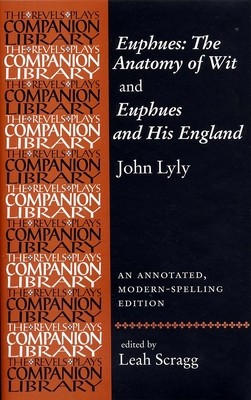
- We will send in 10–14 business days.
- Publisher: Manchester University Press
- ISBN-10: 0719064597
- ISBN-13: 9780719064593
- Format: 14 x 21.6 x 2.1 cm, softcover
- Language: English
- SAVE -10% with code: EXTRA
Euphues: The Anatomy of Wit and Euphues and His England John Lyly (e-book) (used book) | bookbook.eu
Reviews
Description
John Lyly's Euphues: The Anatomy of Wit and Euphues and his England, created a literary sensation in their own age, and had a profound influence on Elizabethan prose. This modern-spelling edition of the two works, the first for nearly a century, is designed to allow the twenty-first century reader access to this culturally significant text and to explore the fascination that it exerted.
Attuned to the needs of both students and specialists, the text is edited from the earliest complete witnesses, is richly annotated, and facilitates an understanding of Lyly's narrative technique by distinguishing typographically between narrative levels. Euphues' Latin poem in praise of Elizabeth I is translated for the first time, and is discussed in an appendix. Of primary importance for students of Renaissance prose, this edition complements the on-going publication of Lyly's dramatic works in The Revels Plays. The introduction includes a discussion of the relationship between the dramatic and non-dramatic work, locating Lyly's plays in a wider context.EXTRA 10 % discount with code: EXTRA
The promotion ends in 17d.18:15:56
The discount code is valid when purchasing from 10 €. Discounts do not stack.
- Publisher: Manchester University Press
- ISBN-10: 0719064597
- ISBN-13: 9780719064593
- Format: 14 x 21.6 x 2.1 cm, softcover
- Language: English English
John Lyly's Euphues: The Anatomy of Wit and Euphues and his England, created a literary sensation in their own age, and had a profound influence on Elizabethan prose. This modern-spelling edition of the two works, the first for nearly a century, is designed to allow the twenty-first century reader access to this culturally significant text and to explore the fascination that it exerted.
Attuned to the needs of both students and specialists, the text is edited from the earliest complete witnesses, is richly annotated, and facilitates an understanding of Lyly's narrative technique by distinguishing typographically between narrative levels. Euphues' Latin poem in praise of Elizabeth I is translated for the first time, and is discussed in an appendix. Of primary importance for students of Renaissance prose, this edition complements the on-going publication of Lyly's dramatic works in The Revels Plays. The introduction includes a discussion of the relationship between the dramatic and non-dramatic work, locating Lyly's plays in a wider context.

Reviews